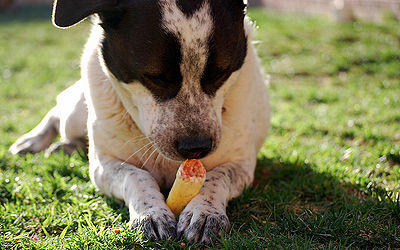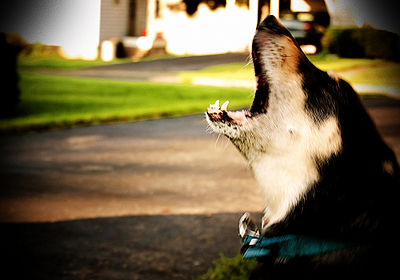Can you spot the different ways your dog uses his/her eyes to send you messages? Pain can cause a squinty look to your dog’s eyes. If your dog’s eyes appear larger than usual, it could mean s/he feels threatened or stressed. Larger or smaller eyes can mean aggression. If the whites are showing (called whale eye), especially when guarding an object, it’s a warning and means the dog is about to become aggressive. Then there’s that soft look that we all recognize which indicates love.
A recent study has shown that dogs communicate with other dogs using their eyes alone. The shape of the eyes, the coloring around the eyes, the shape and color of the iris and the pupil may also be involved in eye communication.
At the Tokyo Institute of Technology, researchers separated canines into 3 groups according to facial coloration and gaze.
Group A had clearly visible pupils and eye position such as in dogs.
Group B had clearly defined eye placement but camouflaged pupils.
Group C had fully camouflaged eyes and pupils.
Group A canines live in groups, adapting to gaze signals, an aid in pack hunting and live cooperatively together. Groups B and C tended to live more solitary lives or in pairs. Group B used eye communication only some of the time. Group C with its dark eyes made it difficult for prey to determine their moves, giving the predators the advantage.
Researchers could only speculate on the effects of eye color. For example, the whites of the eyes (sclera) tend to intensify iris and pupil color. The coloring of the iris in canines did not appear to differ in the groups. Therefore, their conclusion was that the effect of eye coloring in communication was the same for all 3 groups.
Social behaviors were also examined. The more social species within Groups B and C were more likely to use auditory and visual signals to communicate with each other.
Through years of domestication, dogs are able to make direct eye contact with us at times. Jason Goldman, writing in Scientific American magazine, put forth a theory of why: “…Domestication is a genetic process, habituation is an experimental one. Domestication alters nature, habituation is nurture.”
Next time your dog looks at you, try to read the signals s/he is sending. At the same time, your dog is reading the signals you send with your eyes.



